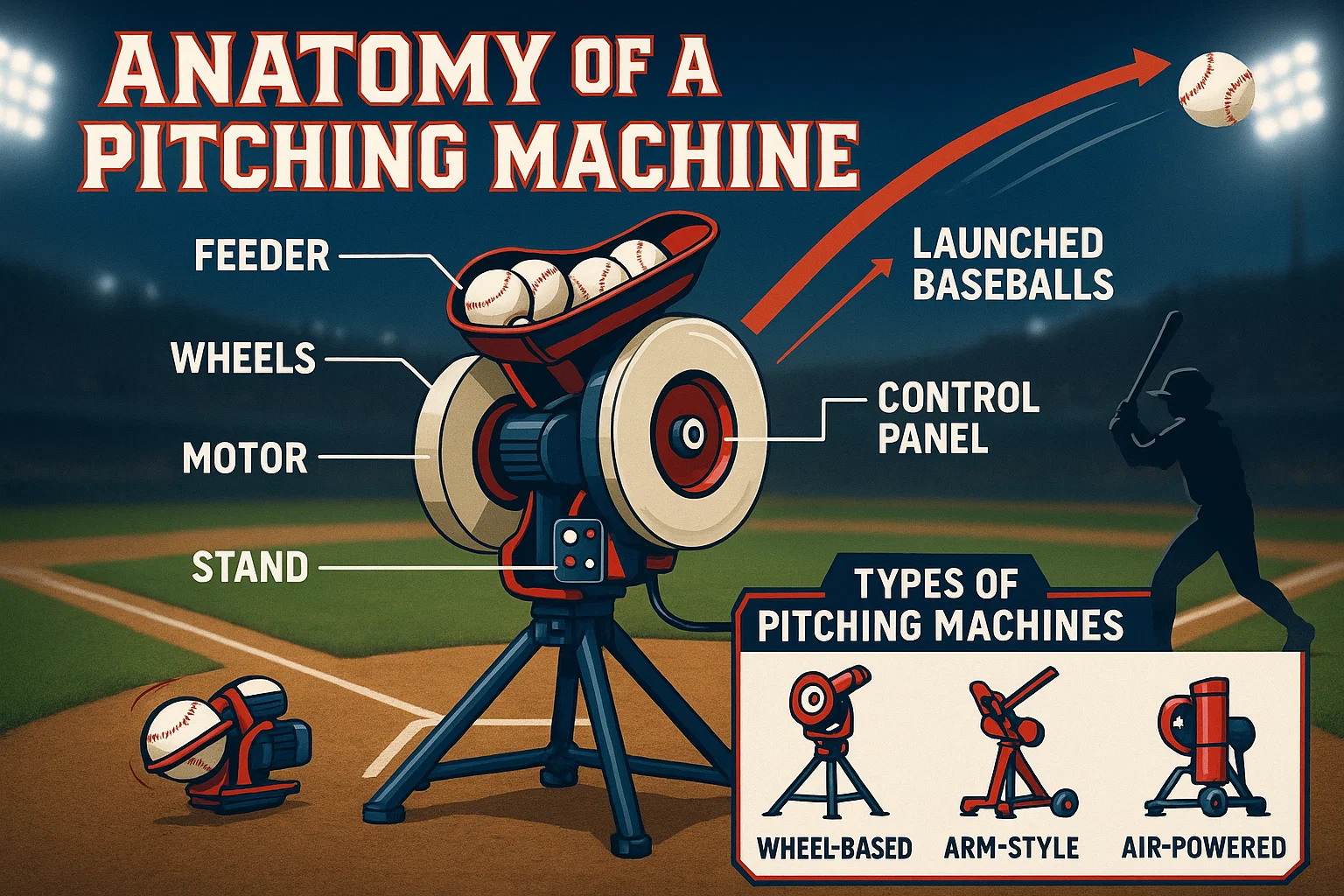In the world of baseball and softball, consistent practice is the key to success. But let’s face it — finding someone to pitch ball after ball, with precision and patience, isn’t always realistic.
That’s where the pitching machine comes in — a game-changing invention that transforms how players of all levels train.
Why Pitching Machines Matter for Every Player
Whether you’re a young athlete stepping into the batter’s box for the first time, or a seasoned player working to fine-tune your swing, the pitching machine offers unbeatable reliability, pitch variety, and pro-grade repetition — anytime, anywhere.
This in-depth guide covers everything you need to know: from types and features to key benefits and how to pick the right machine for your needs.

What Is a Pitching Machines?
A pitching machine is a motorized device that throws baseballs or softballs at various speeds, angles, and styles. It’s built to replicate real-game pitching conditions — letting batters train without needing a live pitcher.
Depending on the model, it can throw:
Straight pitches
Curveballs
Sliders
Changeups
Some high-end machines even mimic the movement of pro-level pitchers. Thanks to this consistency, players improve faster — building timing, hand-eye coordination, and confidence at the plate.
How Does a Pitching Machine Work?
Pitching machines use different internal mechanisms to launch balls. Here’s how they typically function:
1. Wheel Machines
Use 1 to 3 spinning wheels
Grip and shoot the ball with speed control
Ideal for simulating pitch variety
2. Arm Machines
Mimic the motion of a human pitcher’s arm
Great for realistic visual timing
3. Air Pressure Machines
Use compressed air for launching
Usually quieter and lower maintenance
All three allow pitch speed, direction, and type adjustments — creating dynamic, game-like training conditions.
Main Types of Pitching Machines
Let’s break down the most common types so you can choose wisely:
1. Single-Wheel Pitching Machine
Entry-level
Best for casual players or beginners
Limited pitch variety
2. Dual-Wheel Pitching Machine
Greater speed and direction control
Popular in high school and college
3. Three-Wheel Pitching Machine
Most versatile
Offers realistic pitch movement
Used in advanced or professional training
4. Arm Action Pitching Machine
Simulates human pitching motion
Helps with timing and visual cues
5. Softball-Specific Pitching Machine
Designed for fastpitch or slowpitch
Adjustable speeds and underhand delivery
Baseball vs Softball Pitching Machines
Though they serve a similar purpose, there are differences:
Baseball Pitching Machines:
Throw smaller, harder balls
Speeds range from 40 to 90+ mph
Softball Pitching Machines:
Made for larger, softer softballs
Often include underhand pitching options
Some hybrid machines let you switch between both — just by adjusting the feeder or settings.
Who Should Use a Pitching Machine?
The answer is — almost everyone who wants to get better.
Youth Players: Build confidence and coordination
High School & College Athletes: Refine mechanics and increase bat speed
Coaches & Teams: Conduct consistent group training
Parents at Home: Let kids practice safely in the backyard
Even casual players benefit by reducing fatigue and focusing on repetition.
Advantages of Using a Pitching Machine
Here’s why investing in one makes sense:
Consistency: Same pitch, every time
Time-Saving: No need for a pitcher or coach
Adjustability: Control speed, angle, and pitch type
Skill Building: Improve reaction, timing, and swing mechanics
Safe Practice: Train in a controlled setup with less risk

What Is a Pitching Machine Baseball Made Of?
Pitching machine balls are specially designed for safe and effective use. Common materials include:
Dimpled Polyurethane: Durable, bat-safe
Leather-Covered Balls: Provide a realistic feel
Always match the right ball to your machine — using the wrong type can reduce performance or damage the machine.
How to Choose the Right Pitching Machine
Before buying, consider the following:
Age & Skill Level: Younger players need simpler machines
Sport Type: Choose baseball, softball, or combo machines
Pitch Variety Needed: Fastballs only or advanced pitch types?
Power Source: Battery vs electric
Portability: Will you move it often?
Budget: Entry-level ($200–$500) or pro-grade ($1,000+)
Think about how and where you’ll use it — that will help narrow your options fast.
Final Thoughts: Practice Smarter, Play Better
A pitching machine isn’t just a piece of gear — it’s your training partner. Whether you’re swinging in a backyard cage or leading a full team workout, it delivers consistency, focus, and game-like repetition.
From rookies to future stars, the right machine can fast-track progress and turn potential into performance.





